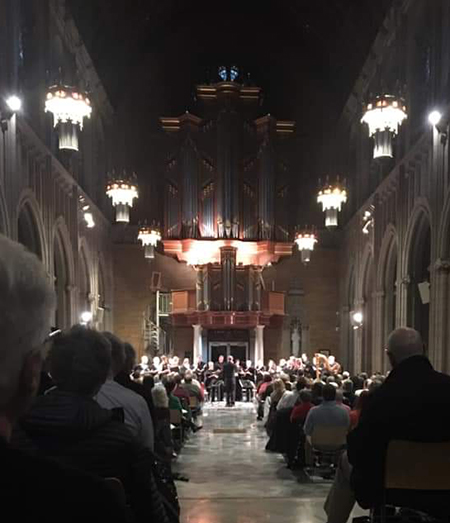by Nicholas Stevens

The Trinity Chamber Singers opened the concert on April 19 with Herbert Howells’s essay after the traditional mass for the dead. Composed in the early 1930s, this setting of excerpts from both the Anglican and Catholic liturgies departs from the standard Requiem text. Channeling controlled grief, the Singers also gave the opening “Salvator mundi” an edge of urgency.
Soprano Anna O’Connell heralded Psalm 23 with lovely tone, her disciplined vibrato infusing the iconic text with muted jubilation. Countertenor John McElliott and tenor Robert Stark furnished a layer of support, the image of a sun-warmed pasture emerging in sound as well as in poetry. Dark textures and coloristic dissonances define Howells’s setting of the “Requiem aeternam” text, and the strong bass section here provided firm foundations for tricky harmonies.
Bass Daniel Fridley was unshakable and prophetic at the beginning of Psalm 121, and the soprano section showed utter mastery of dynamic nuance in the second occurrence of the Requiem text. The concluding section, “I heard a voice from Heaven,” allowed Stark and O’Connell to soar once again. However, the deepest thrill arrived when baritone Brian McGilvray shook the pews with a solo on the concluding lines, his fresh, strong voice ending the program’s most compelling piece in glory.
Providing an interlude and trading the podium for the organ loft, Wilson laced Howells’s Psalm-Prelude, Op. 34, No. 1 with anguished hesitations, underscoring both the affliction and the salvation in Psalm 34, verse 6 with apt choices of stops.
An instrumental sextet and the full Trinity Cathedral Choir then launched into John Rutter’s Requiem. Deftly handling thick chords, the choristers captured contrasting moods in the opening “Requiem aeternam.” Andrew Pongracz’s low thrum of timpani yielded to the sweeter sounds of oboist Danna Sundet and flutist Linda White, reinforcing the journey from dread to peace. A grainy, baritone-like solo from cellist Pamela Kelly lent sonic depth to Psalm 130’s “Out of the deep” passage, and soprano Kristine Caswelch’s solo led a transition from smallness to insistence in the “Pie Jesu.”
Jody Guinn’s harp and Pongracz’s glockenspiel lent a shimmer to the floating soprano lines of the Sanctus. The highlight of the ensemble’s performance of the Rutter piece arrived with the Agnus Dei, a brooding effort to replace the fear of death with the sureness of salvation, anchored by Nicole Keller’s enveloping pitches from the organ pedals. More than the pastoral pleasantness of Psalm 23 or the reassurance of the “Lux aeterna,” this submersion in sublime sound communicated the enormity of death in both Biblical and everyday forms.
Published on ClevelandClassical.com May 6, 2019.
Click here for a printable copy of this article


